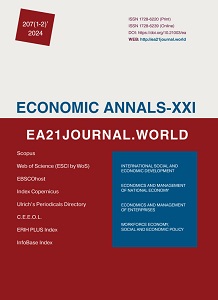Investigation of the impact of technological innovations in mechanical engineering on production efficiency in Kazakhstan
Investigation of the impact of technological innovations in mechanical engineering on production efficiency in Kazakhstan
Author(s): Kazbek Kuandykovich Bokenchin, Laura Bokenchina, Yelena Stavbunik, Olessya ZhidkoblinovaSubject(s): Economy, National Economy
Published by: Institute of Society Transformation
Keywords: Technological Innovations; Mechanical Engineering; Production Efficiency; Labor Productivity; Economic Growth; Econometric Modeling; R&D; Innovation Policy; Kazakhstan
Summary/Abstract: Technological innovations play a crucial role in driving production efficiency, productivity growth, and economic development in the manufacturing sector. The mechanical engineering industry in Kazakhstan has been a key focus of the government’s efforts to promote innovation and competitiveness. However, the relationship between technological innovations and production efficiency in this industry remains underexplored, particularly in the context of an emerging economy like Kazakhstan. This study aims to fill this research gap by developing a comprehensive econometric model that captures the impact of various innovation indicators on the industry’s performance and provides evidence-based policy recommendations for optimizing the innovation strategy. The study employs a novel dataset covering the period of 2019-2023, which includes key variables such as R&D expenditures, patents and inventions, introduction of new technologies and equipment, labor productivity, capital productivity, and the share of innovative products in total output. The data is obtained from official sources, including the Committee on Statistics, the Ministry of Industry and Infrastructure Development, and the National Institute of Intellectual Property of Kazakhstan. The econometric model is specified using a production function approach, incorporating innovation indicators as inputs alongside traditional factors of production. The model is estimated using advanced econometric techniques, such as panel data analysis and time series methods, to account for heterogeneity and dynamic effects. The study also conducts model validation and policy simulations to assess the robustness of the findings and explore the potential impact of different innovation policy measures. The obtained results provide strong evidence for the positive and significant effects of technological innovations on production efficiency in the mechanical engineering industry of Kazakhstan. R&D expenditures, patents and inventions, and the introduction of new technologies are found to be the key drivers of efficiency gains, with elasticities ranging from 0.056 to 0.152. The share of innovative products in total output also emerges as a significant factor, with an elasticity of 0.186. The decomposition analysis reveals that R&D expenditures and the adoption of new technologies account for more than 60% of the total efficiency growth over the period 2019-2023. The policy simulations indicate that a 10% increase in R&D spending and a 15% acceleration in technology adoption can lead to a 3.97% improvement in production efficiency, highlighting the potential for substantial gains through targeted innovation policies. Scientific Novelty. This study makes several important contributions to the literature on technological innovations and production efficiency in emerging economies. First, it develops a comprehensive econometric model that captures the multifaceted nature of innovation and its impact on industrial performance, considering both technological and non-technological aspects. Second, it provides novel empirical evidence on the innovation-efficiency nexus in the context of Kazakhstan’s mechanical engineering industry, which has been largely overlooked in previous research. Third, the study employs advanced econometric techniques and conducts rigorous model validation and policy simulations, setting a new standard for empirical analysis in this field. Practical Significance. The findings of this study have important implications for policymakers, industry leaders, and other stakeholders in Kazakhstan and beyond. The quantitative assessment of the impact of technological innovations on production efficiency provides a solid foundation for evidence-based policy decisions aimed at enhancing the competitiveness and sustainability of the mechanical engineering industry. The policy simulations offer concrete guidance on the potential returns to investment in R&D, technology adoption, and human capital development. The study also highlights the importance of a holistic approach to innovation policy, encompassing both technological and organizational aspects, as well as the need for closer collaboration between industry, academia, and government. By implementing the recommendations outlined in this study, Kazakhstan can unlock the full potential of its mechanical engineering industry and accelerate its transition towards a knowledge-based economy.
Journal: Економічний часопис - ХХІ
- Issue Year: 207/2024
- Issue No: 01+02
- Page Range: 16-28
- Page Count: 8
- Language: English

